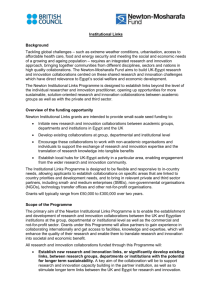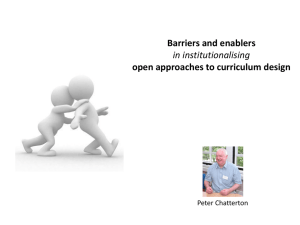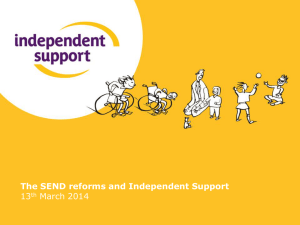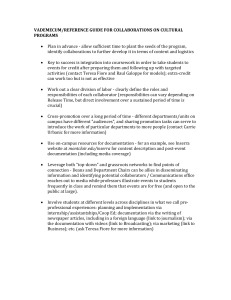- 157 Group
advertisement
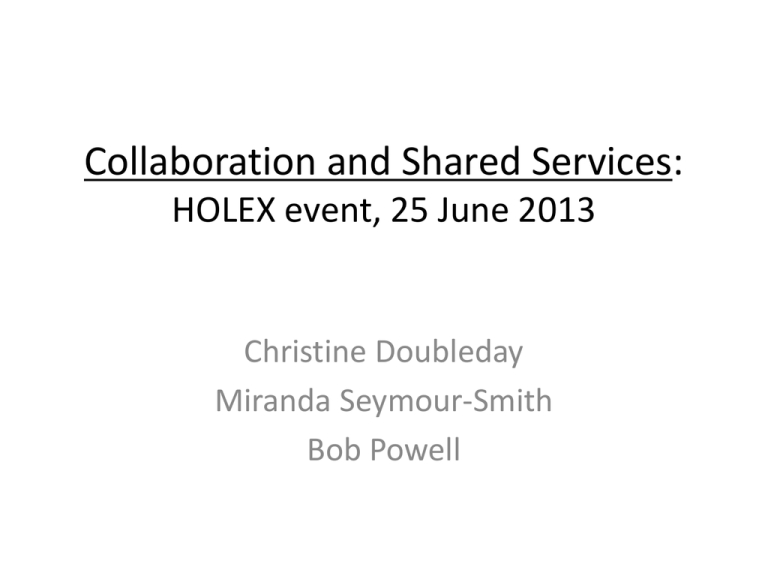
Collaboration and Shared Services: HOLEX event, 25 June 2013 Christine Doubleday Miranda Seymour-Smith Bob Powell Cross-sectoral Steering Group • • • • Christine Doubleday, 157 Group Tim Ward, TSNLA (Chair) Ian Yarroll, NIACE Miranda Seymour-Smith, OHA (Projects Manager, R&D) • Bob Powell, HOLEX How we have worked • Regular (but not overly frequent) meetings – London, Evesham and via tele-conference • 157 sourced the budget • HOLEX National Office managed delegated funding and provided secretariat • Focus on local authority services and on third sector organisations – though looking for cross-sectoral working too • Initial mapping and gapping • Selected Pathfinders (SWL&S, VOLA) - £100k • Invited bids for a Challenge Fund - £120k (over-bid) • Reports on these by Christmas 2012 (some slippage) Challenge Fund Projects • • • • • • • • Bristol/WoE Consortium Bracknell Forest and Wokingham* North Yorkshire Learning Plus/V-Learning Net Lincolnshire-led Benchmarking Club (withdrew part-way) Plymouth, Devon, Cornwall & CIOS Greater Reading Redbridge Institute and Barking & Dagenham* • Two national meetings • Encouraged to link • Interim and Final Reports, to an agreed framework Learning Points • Meaningful partnership working takes time and involves the development of shared vision, culture, systems and operations. Real commitment is needed from the core members of any partnership for its work to be effective. Our projects show the importance of the driving force of a Co-ordinator, working to ensure adherence to an agreed action plan. The involvement of senior managers has in cases been key: “attendance by Heads of Service has been crucial in order that decisions can be made there and then”. Productive collaborations need clear trust, openness, honesty and transparency for anything to work. Excellent communication between services is a further key requirement Shared services in a local authority setting are always going to be dependent on wider local authority activities. Conflicting work priorities of other teams, especially corporate services, can impact deleteriously on project timeframes • FE colleges appear to have difficulties in rationalising their priorities when engaging with collaborative working Learning Points 2 •Additional contingency time should be considered to account for situations and issues that arise within the different partner organisations, which have the effect of limiting the time available to spend on the project Investment is needed at the outset of developing a shared service approach; any financial gains are likely to be achieved longer term Several projects to a greater or lesser extent have found resistance amongst partners to the expectation that organisations would be willing to share resources: we suspect this to be a generic characteristic of this type of work For organisations that operate across a wide geographic area, shared back room services may not be a viable option. Interestingly, both Pathfinders found little advantage to be gained in pooling administrative functions. Collective purchasing arrangements, in particular, have been found to expose the lead organisation to considerable (and possibly unacceptable) risk Learning Points 3 • Enablers There was much agreement among providers about what kinds of factors stimulated and supported success. The emphasis was placed on trust, openness and transparency as indispensible factors, as were time, careful planning and clarity of goals • Blockers Factors reported as inhibiting success tended to vary across projects more than did the ‘enablers’, based on individual providers’ circumstances. There was unanimity, however, that not having enough time was a serious problem Continuation Phase Re-visiting the mapping to secure updates and lessons • Barriers loom large • If not compulsory, not prioritised • SFA needs to be more flexible about kinds of collaborations, not just sub-contracting • Need transparency and shared goals • Needs to be written into an agreement Continuation phase 2 London-based SDIs as Collaboration Hubs (£40k+) •City Lit, Mary Ward, Working Men’s College and Morley College •Collaboration is a strategic objective and promoted from the top •Different collaborations have different aims •Focused on learners Continuation phase 3 SDIs • • • • • • Role of Governors Widening participation Learner benefit Reputational Financial Promotion Continuation Phase 4 Third Sector Consortium Development/ partnership working (£15k) •Research into benefits of forming consortia in a region which has SFA consortia and one which does not •Meeting to canvass further views •Specific nature of third sector means less easy to demonstrate benefits but easy to see what they could be Importing a wider perspective • • • • College-based collaborations TSNLA-specific project Warwick University evaluation Delphi Study • CD to expand Dissemination • Bulletins • Short inputs at previous HOLEX Network events • Website • Materials repository • Delphi Report Final observations •Not about collaboration per se, but about finding and implementing a whole new way of working •About using partnership as an opportunity to improve learners’ journey and experience of the curriculum



